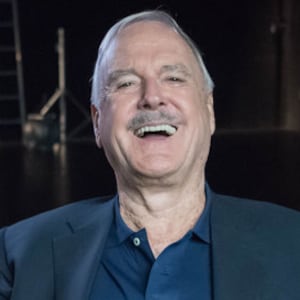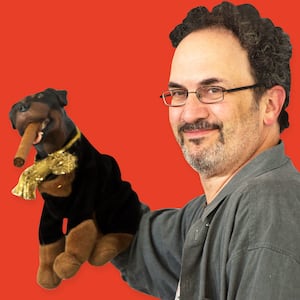Martin Short is widely known as one of the most social people in Hollywood. So how is he handling this seemingly endless pandemic lockdown?
There have been some socially distanced dinners and hikes with famous friends. But mostly he’s following the rules and staying at home. “It’s not complicated. It just, for some bizarre reason, became political,” he says, dryly, on this week’s episode of The Last Laugh podcast. “I wonder why.”
Short, who somehow turned 70 years old back in March, is still capable of the unbounded energy he first showed the world as a cast member on Canada’s premiere sketch comedy series SCTV nearly 40 years ago before joining Saturday Night Live for one glorious season in the mid-’80s. But speaking via Zoom from his Los Angeles home this month—not long after receiving his 18th career Emmy nomination for playing a #MeToo predator on The Morning Show—he comes off as more sincere and reflective than his biggest fans might expect.
In his recent tribute to the late Carl Reiner for The New York Times, Steve Martin opened with the line, “I’ve known only two perfect people in my life. One is that son of a bitch Martin Short; the other is Carl Reiner.”
“I knew Carl as well so that’s a great, great, great, great compliment,” Short, who has talked with Martin “almost every day” over the past five months, says. They are gearing up to start shooting their upcoming scripted series Only Murders in the Building, which he’s hopeful can begin production in a safe way this fall in New York.
Short alludes to a third lead in the series during our conversation, but wouldn’t tell me who it was. After we talked, Hulu revealed that joining the two septuagenarians in the story about three true crime-obsessed New Yorkers is 28-year-old Selena Gomez.
The pair of comedy icons were also supposed to be on tour with their ever-evolving two-man show this summer, but those dates have been pushed to the summer of 2021.
When I ask if he’s worried they will never be able to perform in front of packed theaters again, Short replies, “I wouldn’t say it worries me, but it’s a drag.”
“You know, when you reach a point in your career where you’re not doing it for the rent, then you’re even doing it for a more important reason, which is because you enjoy doing it so much,” he continues. “We all do things in our lives that we don’t want to do to pay bills, but when you are doing it for pure joy and the love of it and no other reason and then that stops, you go, ‘Oh, that's a drag. I hope that comes back soon.’”
Highlights from our conversation are below and you can listen to the whole thing right now by subscribing to The Last Laugh on Apple Podcasts or wherever you listen to podcasts.
On his new Hulu series ‘Only Murders in the Building’ with Steve Martin
“It’s supposed to start filming in October, in New York. It’s called Only Murders in the Building. And it’s about three people who live in one of those upscale apartment buildings in New York. They see each on the elevator, they kind of nod, but they never really speak. They don’t even know each other’s names. And then you find out that each one of them goes to their individual apartments and just turns on true crime and obsesses. And then one time they’re in the elevator with this fourth person. And they find out that fourth person is killed and they’re determined to solve it. But they make a pact: only murders in the building will they solve. Because they can’t be bothered to go outside.”
On his first late-night talk show appearance on ‘Late Night with David Letterman’
“The first talk show that I did in the States was Dave Letterman. It was in December of 1982 and his show had started the February before. I don’t remember being wildly nervous, because I realized at some point in the seventies, when I was about 27, that being nervous did not help me. So I almost willed it away. No one laughs at a nervous comedian, with the exception of a thousand that I can now think of. But even Woody Allen played nervous, but there was more confidence there. So I thought on a talk show, the gimmick would be to capture yourself at a dinner party. That moment when you’re just suddenly on a roll at the dinner party. But you don’t have an hour and a half to ramp up to it. So you have to figure out what you’re going to do. It’s doing an impersonation of someone relaxed. But I remember the first Dave show was not as tricky as you’d think because Paul Shaffer is one of my oldest, closest friends. And Dave was a huge SCTV fan. Even though we were on Cinemax and I was not known in the United States, he was very, very enthusiastic and positive and it couldn’t have been easier.”
Why he left SNL after just one all-star season
“They approached me and they said, we’re interested in you and Billy Crystal and Christopher Guest and Harry Shearer. I went, yeah, OK. Spinal Tap was out that summer. I said, ‘Well you’ll let me know when they say yes.’ And then they phoned up and said, ‘They’ve all said yes.’ And I was like, ‘Wow!’ I suppose I was coming on with more clout, but I didn’t feel it. If you’re sitting there Tuesday night and you don’t have an idea in your head and the read-through is the next day, you don’t sit back and say, ‘Yeah, but look at all the clout I have.’ You feel like a loser. But I would say what made my experience different than others was the fact that I had a one year contract. And by having a one year contract, you really felt like every show is special, you had to deliver every week. So it put even more pressure on. It was always the plan [to leave after one season]. All of us had one year contracts. I had done SCTV for three years before that. I had a new baby daughter. You know, when you do SNL, you’re never home. So I was just ready to do other things. And SNL was switching. I think that they would have wanted me to stay, but now Lorne was coming back. So it was now going to be a totally different cast, a totally different show.”
Why he values the experience of making movies over the final product
“I love an easy, fun set. A loose, laughing, joyful set. And I do everything I can to create that atmosphere, while at the same motivated by selfishness, because that atmosphere will make me better and looser and happier to be at work. A tense set, a mean director just shuts me down. I’m just thinking, when do I get off this horrible mistake I committed to? And by the way, I don’t remember any of those experiences, because I never really had them. I’ve had fun on all these movies because when you make a movie, that’s the last control you have. You can’t control what the film’s going to be. It’s not in your hands, it’s in a director and an editor’s hands what it will be. And you don’t know if the film might be fantastic and no one wants to see it. And then for a couple of years, it’s perceived as a failure until it’s re-released and now everyone loves it. So you can’t control any of that, but you can control the actual experience of doing the job and that you have more power over making it a joyful one or a drag.”
Look out for a bonus episode of The Last Laugh podcast this Friday with stand-up comedian and host of Quibi’s ‘Nice One’ game show, Ron Funches.



